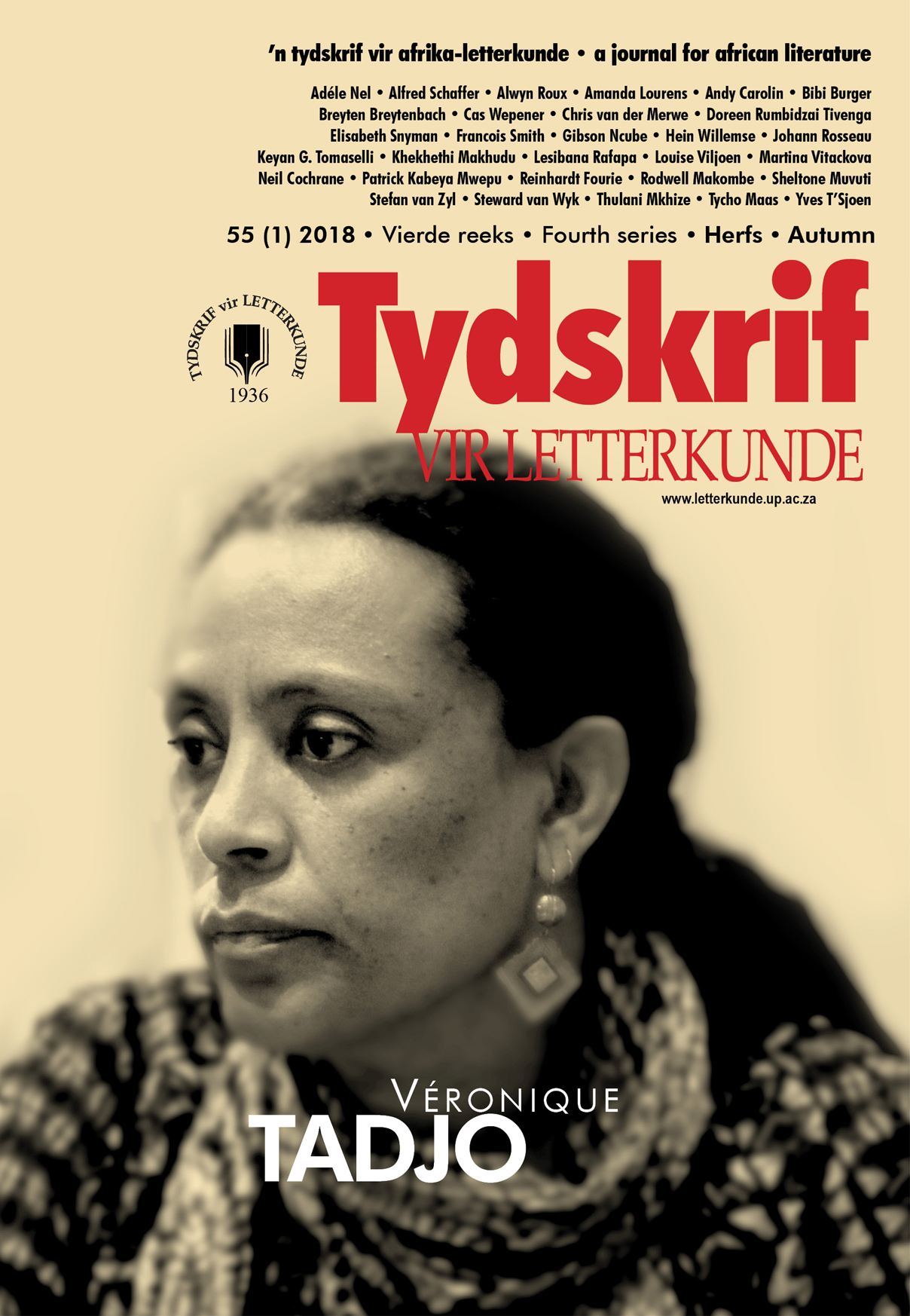Indigeneity in modernity. The cases of Kgebetli Moele and Niq Mhlongo
DOI :
https://doi.org/10.17159/2309-9070/tvl.v.55i1.3038Mots-clés :
Black South African English literature, post-apartheid South Africa, transnational, institutional racism, colour-blindness, indignity, modernityRésumé
The study of South African English literature written by black people in the postapartheid period has focused, among others, on the so-called Hillbrow novels of Phaswane Mpe and Niq Mhlongo, and narratives such as Kgebetli Moele's Book of the Dead (2009) set in Pretoria. A number of studies show how the fiction of these writers handles black concerns that some critics believe to have replaced a thematic preoccupation with apartheid, as soon as political freedom was attained in 1994. However, adequate analyses are yet to be made of works produced by some of these black writers in their more rounded scrutiny of the first decade of democracy, apart from what one may describe as an indigenous/traditional weaning from preoccupation with the theme of apartheid. This study intends to fill this gap, as well as examine how such a richer social commentary is refracted in its imaginative critique of South African democratic life beyond its first decade of existence. I consider Mhlongo's novels Dog Eat Dog (2004) and After Tears (2007); together with Moele's narratives reflecting on the same epoch Room 207 (2006) and The Book of the Dead (2009). For the portrayal of black lives after ten years of democracy, I unpack the discursive content of Mhlongo's and Moele's novels Way Back Home (2013) and Untitled (2013) respectively. I probe new ways in which these postapartheid writers critique the new living conditions of blacks in their novelistic discourses. I argue that their evolving approaches interrogate literary imaginaries, presumed modernities and visions on socio-political freedom of a postapartheid South Africa, in ways deserving critical attention.  I demonstrate how Moele and Mhlongo in their novels progressively assert a self-determining indigeneity in a postapartheid modernity unfolding in the context of some pertinent discursive views around ideas such as colourblindness and transnationalism. I show how the discourses of the author's novels enable a comparison both their individual handling of the concepts of persisting institutional racism and the hegemonic silencing of white privilege; and distinguishable ways in which each of the two authors grapples with such issues in their fiction depicting black conditions in the first decade of South African democratic rule, differently from the way they do with portrayals of the socio-economic challenges faced by black people beyond the first ten years of South African democracy.
Téléchargements
Références
De Kock, Leon. “The end of ‘South African’ literary history? Judging ‘national’ fiction in a transnational era.” SA Lit Beyond 2000. Eds. Michael Chapman and Margaret Lenta. U of KwaZulu Natal P, 2011, pp. 19–49.
Lund, Joshua. The Impure Imagination: Toward a Critical Hybridity in Latin American Writing. U of Minnesota P, 2006.
Milazzo, Marzia. “Racial power and colorblindness: the ‘Sad Black Stories’ of Kgebetli Moele’s Room 207 and twenty-first century black South African Fiction”. Journal of Commonwealth and Postcolonial Studies, vol 1, no 1, 2013, pp. 33–59.
Milazzo, Marzia. “Reconciling racial revelations in post-apartheid South African literature.” Research in African Literatures, vol 47, no 1, 2016, pp. 128–48.
Milazzo, Marzia. “The rhetorics of racial power: enforcing colorblindness in post-apartheid scholarship on race.” Journal of International and Intercultural Communication, vol 8, no 1, 2015, pp. 7–26.
Mhlongo, Niq. Affluenza. Kwela Books, 2016.
Mhlongo, Niq. After Tears. Kwela Books, 2007.
Mhlongo, Niq. Dog Eat Dog. Kwela Books, 2004.
Mhlongo, Niq. Way Back Home. Kwela Books, 2013.
Moele, Kgebetli. Room 207. Kwela Books, 2006.
Moele, Kgebetli. The Book of the Dead. Kwela Books, 2009.
Moele, Kgebetli. Untitled. Kwela Books, 2013.
Mphahlele, Es’kia. “Notes towards an Introduction to African Humanism: A Personal Inquiry.” Es’kia. Kwela Books in association with Stainbank & Associates, 2002, pp. 134–41.
Mphahlele, Es’kia. “What’s New in The New South Africa?” Es’kia. Kwela Books in association with Stainbank & Associates, 2002, pp. 252–4.
Murray, Sally-Ann. “On the street with Vladislavic, Mhlongo, Moelele and others”. SA Lit Beyond 2000. SA Lit Beyond 2000. Eds. Michael Chapman and Margaret Lenta. U of KwaZulu Natal P, 2011, pp. 69–96.
Rafapa, L. “Oral literature and the evolving Jim-goes-to-town motif: Some early Northern Sotho compared to selected post-apartheid novels written in English.” Literator, vol 37, no 1, 2016. a1251.http://dx.doi.org/10.4102/lit.v371l.1251.
Titlestad, Michael. “Writing the city after apartheid.” The Cambridge History of South African Literature. Eds. David Attwell and Derek Attridge. Cambridge U P, 2012. 676–96.
Téléchargements
Publiée
Numéro
Rubrique
Licence
(c) Copyright Tydskrif vir Letterkunde 2018

Ce travail est disponible sous licence Creative Commons Attribution - Partage dans les Mêmes Conditions 4.0 International.


 https://orcid.org/0000-0001-6465-6584
https://orcid.org/0000-0001-6465-6584


.png)